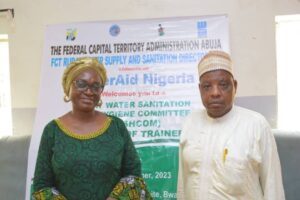WaterAid, an NGO, in collaboration with Rural Water Supply and Sanitation Agency (RUWASSA), convened a capacity building workshop for 27 master trainers on WASHCOM expanded guidelines for water Hygiene and Sanitation in the Bwari Area Council of the FCT.

The 27 participants at the five-day training were drawn from across various WASH units, RUWASSA, civil society organisations, and the WASH media who will see to advocacy of WASHCOM activities.
Dr. Mohammed Hassan, Executive Director, RUWASSA, during his opening remarks stated that the importance of the training is to ensure community participation and involvement in the management of water hygiene and sanitation in Bwari Area council Communities.
Speaking on behalf of the Director, Alhaji Hussaini Abdulkadir, Head of Department, Community Mobilisation and hygiene promotion, FCT RUWASSA, noted that the training the trainers is very critical to wash activities in general.
“If you give an intervention in a community and there is no one to own it and take responsibility for its management, there will be no sustainability.
“For example, a borehole and toilet that may have been erected after triggering a community before you know it, may be vandalised in no time due to lack of adequate care,” he said.
According to him, they serve as caretaker committees that will ensure ownership and sustainability of interventions .
“Those people who will train washcom are being trained today by facilitators so that they can step down the training when they go back to their area councils,” he added.
Aisha Bakpet, Head of Sanitation Department, FCT RUWASSA, said that the organisation of the training which is supported by WaterAid “is apt and targeted at community level.
“They have been supporting us on these series of trainings for Bwari Area Council since January.
“For today, the five-day training is the WASHCOM training, a train the trainers workshop that will integrate all aspects of WASHCOM in one training.
“The participants will go down to the communities and train the WASHCOM to sustain the activities.
“It is integrated, they need to start up a system to start owning what belongs to them and begin to seek support for their health services and water and hygiene services themselves by themselves,” she added.
Nanbam Michael, Programme Manager, WaterAid Nigeria, said that WaterAid wants to strengthen communities in the Bwari Area Council to ensure they have committee’s that sees to a sustained functional water Sanitation management in the community level.
“In Nigeria generally, maintenance and sustainability is a huge problem ,you will see a water source facility in a community with just a little problem and you will see people are busy buying water.
“Residents in various communities, despite having functional water supply systems, still suffer lack of and water related diseases and issues because no one is entrusted with the responsibility of handling such repairs which usually only requires little funds to fix.
“If there is clean water and people are taking care of them ,there will be no disease outbreak and issues around water hygiene and Sanitation will be at the barest minimum.
“We are here to support the government to ensure that facilities are functional and issues around sanitation and hygiene are carried out the right way and ensure that everybody has water by 2030,” she added.
By Patricia Amogu
